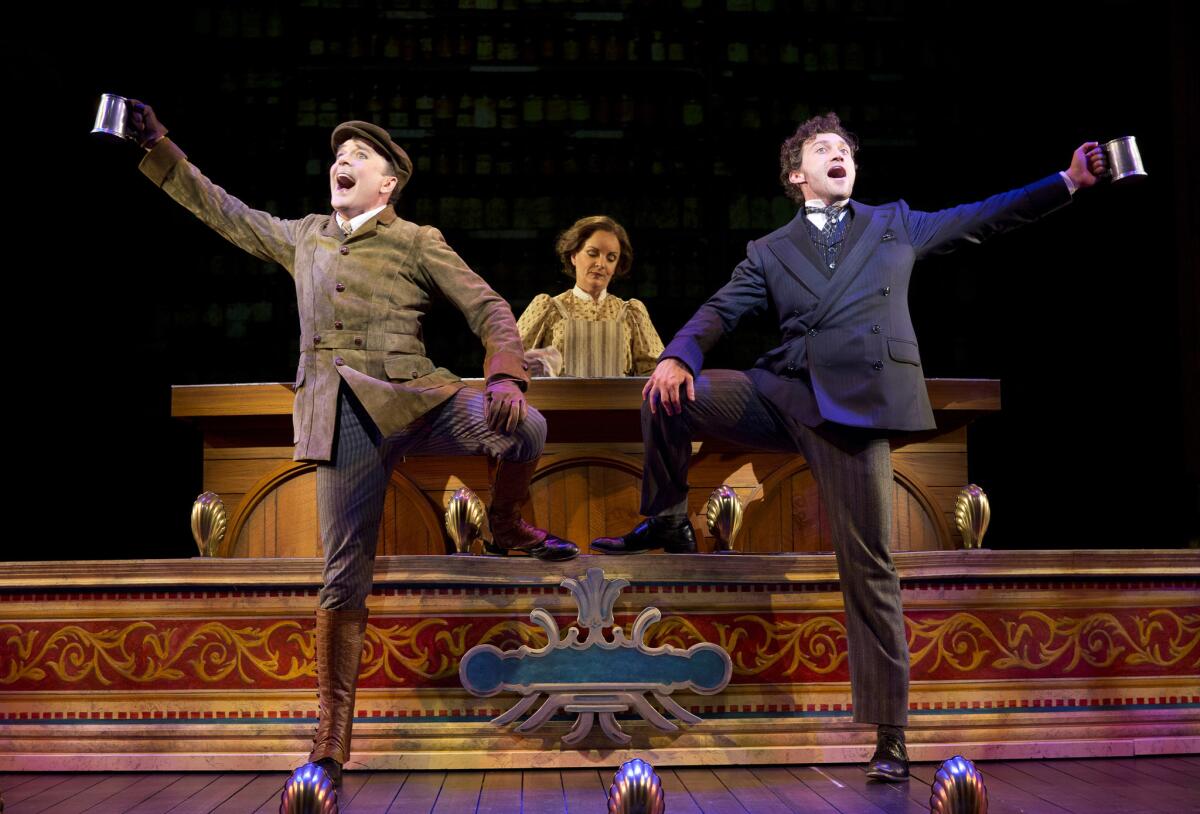Critic’s Notebook: Tony Awards 2014: A few rays of sunshine in a mostly cloudy Broadway season

The Tony Awards will be handed out Sunday, and the safe money is on “A Gentleman’s Guide to Love & Murder” for best musical and “All the Way” for best play. But nothing is guaranteed in a Broadway season as patchy as this one.
There’s a fair chance that “Beautiful: The Carole King Musical” could pull off the upset. I’d like to see that happen. “Beautiful” may be a more commercial jukebox venture, but I appreciated its tender focus on the diffident genius behind the music (delicately portrayed by Jessie Mueller) and the human scale of its production.
I won’t be too bummed, however, if “Gentleman’s Guide” picks up a trove of statuettes, as many are predicting. I liked the show well enough when I saw it at San Diego’s Old Globe and thought it looked great at the Walter Kerr Theatre. Even if Robert L. Freedman’s book still hasn’t worked out all the kinks and Steven Lutvak’s music can be rather forgettable when not transporting the duo’s clever lyrics, the authors are likely to be rewarded for their creative effort and intermittent ingenuity.
What do awards honor? Sometimes excellence in execution, sometimes scope of ambition. Sentiment, as Elizabeth Taylor’s PR people understood perfectly, can also play a role. In short, these accolades are relative not only in the temporal sense of saluting the so-called best in a given season (no matter how mediocre) but also in terms of what exactly is being singled out for distinction.
How, for instance, does one decide between the transgender punk act of Neil Patrick Harris in “Hedwig and the Angry Inch” and the music-hall-worthy shape-shifting of Jefferson Mays in “Gentleman’s Guide,” the front-runners for lead actor in a musical? Their theatrical dynamism may be roughly equivalent, but choosing between their performances is as impossible as deciding a beauty contest between a kangaroo and an ostrich.
Does Harris’ distinguished service as Tony emcee over the years, combined with the fact that Mays has already won a Tony, give him the edge? That might sway me. The Tonys, like the Oscars, the Emmys and the Grammys, are no pure meritocracy — a word that in this context can’t help eliciting a little chuckle.
The five nominated plays this year would wither under the glare of object scrutiny were they evaluated exclusively on dramaturgical merit. The favorite, Robert Schenkkan’s “All the Way,” is a three-hour slab of American politics that’s animated by a vigorous cast led by the indefatigable Bryan Cranston as President Lyndon B. Johnson calling in his congressional chips to get the Civil Rights Act of 1964 passed. It has my vote but largely for the electricity of Bill Rauch’s production and for its extra-theatrical value of reminding forgetful Americans of their legislative past.
“Act One,” James Lapine’s unwieldy adaptation of Moss Hart’s indelible theater memoir, has its ardent fans, so “All the Way” could be overtaken at the finish line. If I had my druthers I’d have the best play award go to Lorraine Hansberry’s “A Raisin in the Sun,” despite the technicality that the drama first appeared on Broadway in 1959. “Raisin” received a nomination when it premiered but lost out to William Gibson‘s “The Miracle Worker.” So much for the omniscience of Tony voters.
Kenny Leon’s production of Hansberry’s classic, which stars Denzel Washington and a trio of gifted actresses (LaTanya Richardson Jackson, Sophie Okonedo and Anika Noni Rose), all three of whom were nominated, has an acuteness that the new plays this year conspicuously lack. This is a comment more on the state of Broadway than on American playwriting, which is flourishing in quarters far from the madding crowd of tourists and empty spectacle junkies.
Much as I am a fervent admirer of Audra McDonald’s historic talent and would be delighted to see her win a record sixth Tony Award, I’d be secretly thrilled if Jackson pulls off the unexpected though by no means unthinkable win for her performance as the matriarch of the Younger clan. Jackson came late to this production of “Raisin” (filling in after Diahann Carroll dropped out during rehearsals) and has become the anchor of an exceptionally moving revival.
What’s more, I think McDonald’s performance is mistakenly categorized. “Lady Day at Emerson’s Bar & Grill” may be considered a play when certain actors perform the role, but when McDonald as Billie Holiday delivers more than a dozen songs (plus a reprise of “What a Little Moonlight Can Do”) in a 90-minute show, it’s her magnificent singing that has the greatest dramatic impact.
Revivals in general were the silver lining of this mostly cloudy season. The race is widely thought to be between “The Glass Menagerie” and “Twelfth Night,” a contest that I would decide in Shakespeare’s favor, because I very much doubt that I’ll ever see a better production of “Twelfth Night” than Tim Carroll’s all-male production, and I preferred the revival of “Glass” with Judith Ivey’s Amanda Wingfield that came to the Mark Taper Forum in 2010.
My other acting preferences: Mueller as Carole King for lead actress and Anika Larsen as Cynthia Weil for featured actress, both from “Beautiful.” Nick Cordero for his supporting gangster turn in “Bullets Over Broadway.” Rose for her astringent take on Beneatha in “Raisin,” a featured performance that maximizes every moment of stage time. Cranston as a brilliant, brokering LBJ for lead actor in a play and Mark Rylance for his giddy, love-sick Olivia in “Twelfth Night” for featured actor.
For directing, I’d be happy if either Darko Tresnjak (“Gentleman’s Guide”) or Warren Carlyle (“After Midnight”) would win in the musical category and if either Leon or Carroll would triumph in the play category (though “Glass” has strong support and John Tiffany could easily take the prize).
The moral of the story is that even in a Broadway year that can hardly be considered banner, there’s more talent than statues to go around.
More to Read
From the Oscars to the Emmys.
Get the Envelope newsletter for exclusive awards season coverage, behind-the-scenes stories from the Envelope podcast and columnist Glenn Whipp’s must-read analysis.
You may occasionally receive promotional content from the Los Angeles Times.







